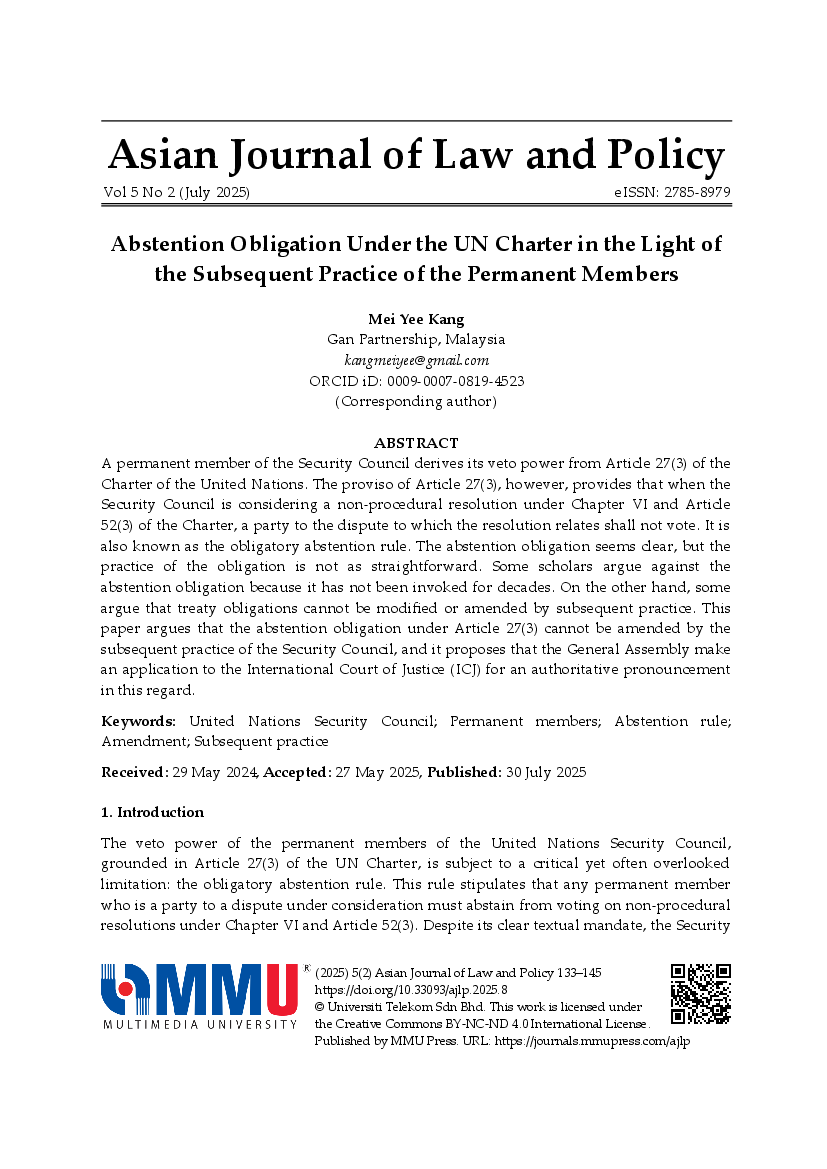Abstention Obligation Under the UN Charter in the Light of the Subsequent Practice of the Permanent Members
Main Article Content
Abstract
A permanent member of the Security Council derives its veto power from Article 27(3) of the Charter of the United Nations. The proviso of Article 27(3), however, provides that when the Security Council is considering a non-procedural resolution under Chapter VI and Article 52(3) of the Charter, a party to the dispute to which the resolution relates shall not vote. It is also known as the obligatory abstention rule. The abstention obligation seems clear, but the practice of the obligation is not as straightforward. Some scholars argue against the abstention obligation because it has not been invoked for decades. On the other hand, some argue that treaty obligations cannot be modified or amended by subsequent practice. This paper argues that the abstention obligation under Article 27(3) cannot be amended by the subsequent practice of the Security Council, and it proposes that the General Assembly make an application to the International Court of Justice (ICJ) for an authoritative pronouncement in this regard.
Article Details

This work is licensed under a Creative Commons Attribution-NonCommercial-NoDerivatives 4.0 International License.
References
Clyde Eagleton, ‘The Jurisdiction of the Security Council Over Disputes’ (1946) 40(3) American Journal of International Law 513
Irina Buga, ‘Subsequent Practice and Treaty Modification’ in Michael J Bowman and Dino Kritsiotis (eds) Conceptual and Contextual Perspectives on the Modern Law of Treaties (Cambridge University Press 2018)
Jessica Liang, ‘Modifying the UN Charter through Subsequent Practice: Prospects for the Charter’s Revitalisation’ Nordic (2012) 81(1) Journal of International Law 1
Joost Pauwelyn, ‘The case study: The law of the World Trade Organization’ in Conflict of Norms in Public International Law: How WTO Law Relates to Other Rules of International Law (Cambridge University Press 2003) 25
Laurence W. Maher, 'Half Light Between War and Peace: Herbert Vere Evatt, the Rule of International Law, and the Corfu Channel Case' (2005) 9(1) Australian Journal of Legal History 47
Maurizio Arcari, 'Limits to Security Council Powers under the UN Charter and Issues of Charter Interpretation' (2012) 32 Polish Yearbook of International Law 239
Peters Anne, ‘The war in Ukraine and legal limitations on Russian vetoes’ (2023) 10(2) Journal on the Use of Force and International Law 162
Rebecca Crootof, ‘Change without consent: how customary international law modifies treaties’ (2016) 41(2) The Yale Journal of International Law 237
Stephen Eliot Smith, ‘Reviving the Obligatory Abstention Rule in the UN Security Council: Reform From the Inside Out’ (2014) 12 New Zealand Yearbook of International Law 15
Western Sahara (Advisory Opinion) 1975 International Court of Justice Rep 12

